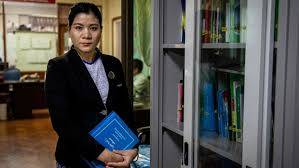YANGON - Domestic abuse in Myanmar is regarded as a family matter and even if it is reported, the police fail to take action,” lawyer and activist Hla Hla Yee says, adding that many still view it as a normal part of marriage that women must endure.
The UN has warned violence against women and girls is a “silent emergency” in the country, with incidents spanning groping on public transport to trafficking, and has called for a zero-tolerance approach in communities, police, and the justice system.
Analysis by the Demographic and Health Survey suggested at least one-fifth of women were abused by a partner in 2016.
According to government statistics, there were 1,405 rape cases in 2017, up from 1,110 the year before -- around two thirds committed against children. But Hla Hla Yee says these figures are just the tip of the iceberg in the country of 54 million.
Victims, who are required to prove there was no consent, are routinely blamed and ostracised in the rare cases when the perpetrator is found guilty.
There is no specific law against domestic abuse and the penalty of marital rape is a maximum of two years in prison. “Women’s rights are not prioritised and are not respected,” the 38-year-old explains.
While violence against women is a global problem -- the UN estimates 1 in 3 will experience abuse in their lifetime -- many in Myanmar feel there is no point speaking out due to police inaction, social stigma, and a male-dominated justice system.
- ‘Justice for all’ -
Married women are often stuck with no financial or social means to escape. When rape happens outside of marriage, experts say a settlement between the perpetrator and families is often agreed without consulting the victim. Hla Hla Yee and her team hope to give these women a voice.
Outraged by how hard it is for marginalised groups to get justice, she and a group of lawyer friends used their own money to found and run the Legal Clinic Myanmar, which gives free consultations and legal aid to those least able to afford it. “Justice for all is unanimously accepted by all lawyers working here,” she says. In the nine years since the venture first opened, it has grown from less than a dozen staff to more than 70, with ten branches across Myanmar and operates mainly with women in leadership positions.
It offers legal aid, training, and advice via a 24-hour hotline, and a mobile team which can reach people in need faster. Breastfeeding her infant daughter as she answers calls or gives presentations, Hla Hla Yee embodies the juggle of modern motherhood.
But she is keenly aware that Myanmar -- despite the rise to power of female civilian leader Aung San Suu Kyi -- is yet to catch up.
It still has few women in decision-making positions and laws are often made by men, for men.
“I was really worried about marriage because of the abuse cases reported to us. I even thought of not marrying as I know the law that does not protect women,” she reveals.






